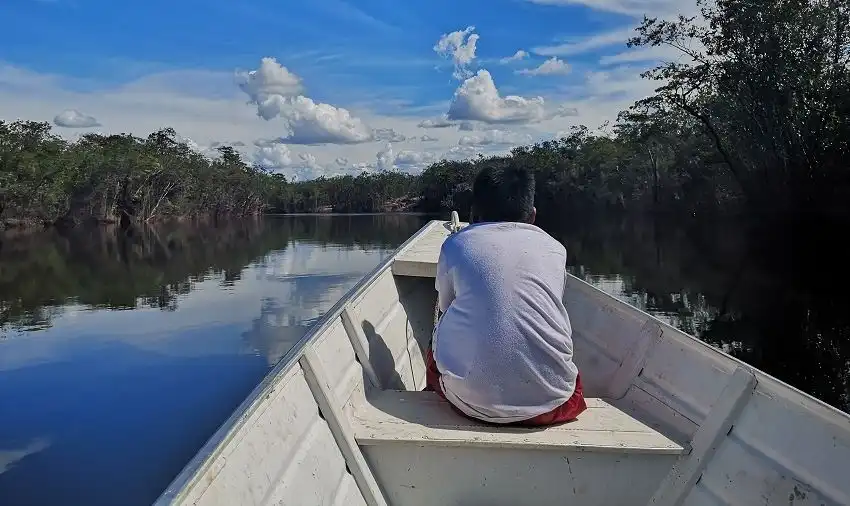Home>Habláme de Educación: a podcast on public education in Colombia
13.07.2023
Habláme de Educación: a podcast on public education in Colombia

Ana Sofia Torres Diaz, a recent graduate of the Master in Public Policy, Politics and Public Policy stream, tells us about the education project she carried out in Colombia during her gap year.
You took part in the SDG certificate last year, on a project about education through radio in Colombia. Could you tell us about your project?
The project our group developed during the SDG Certificate, now known as the SDG Initiative, is a radio-based education solution for rural and isolated areas in Colombia, to enable academic continuity during the COVID period. According to UNICEF figures, Latin America was the region most affected educationally by COVID, with 80% of teaching time disrupted due to the complete closure of schools. In Colombia, schools remained completely and partially closed for 77 weeks (almost a year and a half). However, the impact on students' academic continuity was uneven, and this figure cannot be taken as a general figure. In privileged urban environments, students quickly switched to well-structured online learning. While other students, even in connected environments, had problems accessing computer equipment. In rural and isolated areas, the absence of an Internet network and the long distances between schools and students' homes made academic continuity almost impossible. That's why, after extensive discussions with a number of stakeholders, including a school in Casanare (a region in the east of Colombia), we developed a method for teachers to give lessons via radio, and for students to be able to follow up more regularly via a basic phone.
You wanted to go further and return to Colombia during your gap year to produce a report in podcast form. What can we hear in the podcast episodes?
Following the experience of the SDG Certificate, which was completely distance learning at the time, I wanted to go to Colombia during my gap year and reflect on the state of public primary and secondary education in the country. It was important for me to gather the country's social and territorial contrasts, so in each episode of the podcast you'll hear from a different stakeholder in the Colombian education ecosystem.
In the first episode, Gloria Bernal, co-director of the Laboratory of Economics of Education at Javeriana University, gives us an overview of inequalities in education, based on statistics and public policy. Then, those directly involved in the field share their stories and the obstacles they face on a daily basis. For example, teachers at a school in the Amazon region tell us how they adapt their teaching to students from indigenous communities, for whom Spanish is their second language. In La Guajira (an arid region in the north of the country), Beatriz Salas and José Vidal, two student leaders, tell us about the deplorable state of their region's schools and the problem of malnutrition, which prevents pupils from learning properly. Other issues, such as positive discrimination for Afro-descendant communities and education for peace, a field in which the country is a laboratory of pedagogical innovation, are also developed.
To know more: https://www.sciencespo.fr/opalc/podcast.html
What did you discover during your stay? What conclusions did you draw from your experience?
Being of Colombian origin, this stay enabled me to rediscover the country from another angle. During my stay, I wanted to take a step back and look at things from an observer's point of view, so as to be better able to understand what was being experienced and, later, to draw up a better analysis. I had several intuitions which were confirmed during this survey, such as the lack of financial and human resources to ensure quality education in both urban and rural areas. But I also realized that there were administrative problems that had serious consequences for students' academic years. For example, once teachers are appointed to public schools, they can be sent anywhere in the country. This policy means that teachers can find themselves in places far removed from their home, with very uneven infrastructures and services. For example, a teacher from Bogota, the capital, may find himself in a small community in the middle of the jungle, a few hours by river shuttle from the nearest city with banks, hospitals and other services. This situation is very difficult for some, who consequently fail to teach properly and leave in the middle of the year. What's more, the bonuses are not enough to encourage them to move to such isolated locations. Similarly, teachers who come from these isolated communities and are familiar with the local context and way of life may be transferred to urban environments, which hampers the transmission of knowledge, particularly in indigenous communities.
In areas still at the heart of Colombia's armed conflict, teachers are often targeted by armed groups because of their position as community leaders, without sufficient protection from the state.
Being a teacher in Colombia is knowing how to adapt, to be the liaison between the programs that come from the centralized government and the communities, to try to reduce social inequalities with the means at hand.
What are your plans for the future?
I'd like to continue to explore development issues, particularly from an international cooperation perspective, while staying close to the ground. I've also found the podcast format an excellent way of delving into a subject, and I hope to start a new one soon on the challenges of renewable energies.
Learn more
Information Sessions: Masters

Find out more about the Masters programs and the wide choice of specialisations offered by the 8 Schools of Sciences Po during our webinars dedicated to applicants.